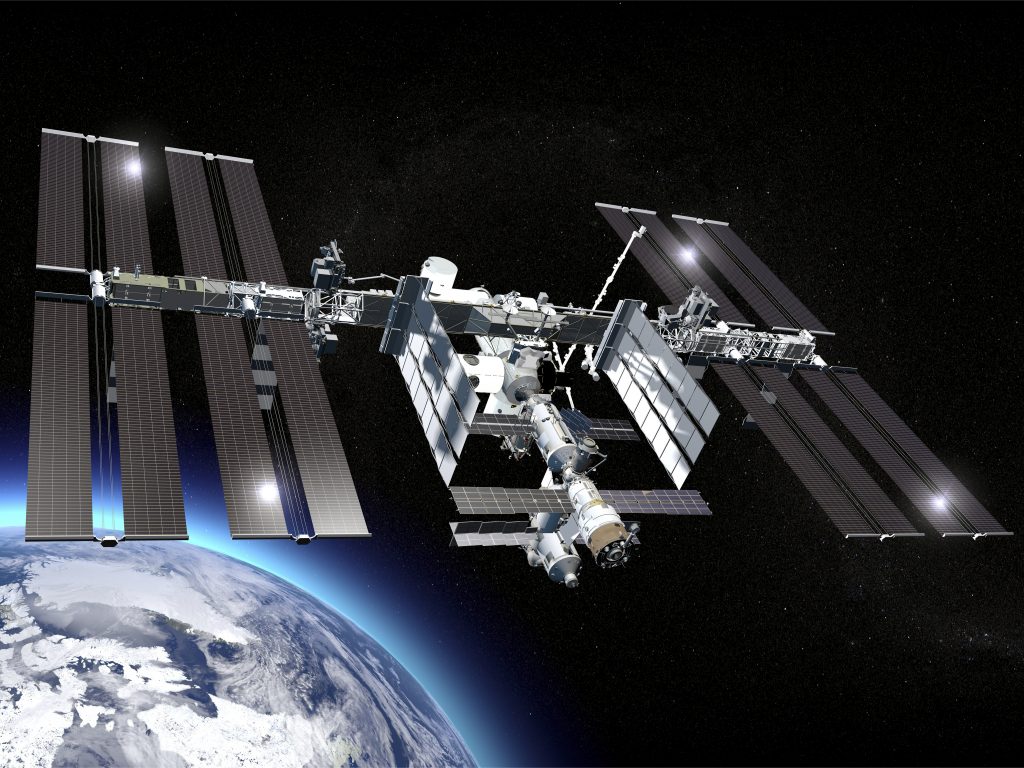The world of technology is a wonderful thing, and we already live on a planet filled with amazing accomplishments that we often take for granted. We fly in planes, and drive in cars, and have operations performed with lasers. We can literally grow edible meat in a Petri dish! So, is it that far out to think we might be able to grow weed in space? Think again if it sounds incomprehensible, because the out-of-this-world idea, might become a real thing.
The idea to grow weed in space might sound super far out there, but it’s actually a reality of modern technology. Not only is cannabis researched in space, but whole new ways of growing it have been devised. We cover everything related to the growing industries of cannabis and psychedelics, which you can keep up with by subscribing to THC Weekly Newsletter. You’ll also get direct access to offers on edibles, vapes, and lots of other cannabis paraphernalia, including cannabinoid products. We do remind you, *cannabinoid compounds are not everyone’s first choice. We don’t advise anyone purchase a product they are not comfortable with!
Zero-gravity research?
Since 2017, Kentucky-based start-up company Space Tango has been conducting some pretty interesting research into microgravity. Space Tango is a tech company that develops health and technology products, and does so in space. This means scientists at the International Space Station are able to hold experiments in controlled gravity environments. These experiments are done through inventions like CubeLab, which is a box that allows for experimentation within a controlled environment, and ST-42 which is a “reusable, re-entry free-flying orbital platform” that “utilizes microgravity to manufacture health and technology products…”
According to the company, “Microgravity is a unique attribute of low-Earth orbit, that when utilized as an innovation platform yields solutions that simply do not or cannot exist terrestrially. Microgravity can affect the physical properties of materials and fluids, as well as biological systems.”
It goes on to say: “Coupled with expertise in science and engineering, our capabilities include design, integration, safety and regulatory processes. Space Tango works with partners in the following areas: cell culture, thin film manufacturing, flow chemistry, tissue chips, plant science, and microbiology.”

Can we grow weed in space?
Space Tango has created a way for research to be done in microgravity situations, and one of its uses thus far is with plant science. As of a 2020 writing, Space Tango sent out eight missions, did 88 experiments, and delivered 53 payloads, starting from 2017. One of the lines of research currently under investigation, is growing cannabis in zero-gravity conditions. The goal of said research is to find hemp strands for medical use.
As of the 2020 writing, Space Tango has two micro labs on the International Space Station, which are housed in microwave-sized areas called ‘clean rooms’. The company uses its CubeLab technology to see how cannabis will do in different gravity situations. To get an idea of the popularity of knowing how something will grow in zero-gravity, beer makers Anheuser-Busch sent barley into space to investigate how it grows in near zero-gravity environments, as well.
The beauty of CubeLab technology is that the boxes operate autonomously, allow for near real-time monitoring and data downloads, can be operated from earth, and create mini microgravity chambers that can account for issues of stress to plants, like force and gravity. As THC is globally illegal, it’s not the subject of testing right now, although this will likely change if laws do. Right now, it’s all about hemp.
Space Tango’s main point of study is to see if certain strains grow better without the stress of gravity. Says Dr. Joe Chappell of the Space Tango Science Advisory Team “When plants are ‘stressed,’ they pull from a genetic reservoir to produce compounds that allow them to adapt and survive… Understanding how plants react in an environment where the traditional stress of gravity is removed can provide new insights into how adaptations come about and how researchers might take advantage of such changes for the discovery of new characteristics, traits, biomedical applications and efficacy.”
Space Tango’s own research into zero-gravity cannabis started a few years ago, but the company also works with Atalo Holdings, a provider of hemp genetics, and Anavii Market, an ecommerce site for hemp-derived CBD products. Space Tango set up its research alongside these companies. According to Space Tango co-founder and chairman Kris Kimel in 2020, the company is launching payloads for both corporate and university customers, around six times a year.
Who else is looking to grow weed in space?
Another company coming at it from a different angle is Bioharvest. Bioharvest is a biotechnology company that researches plant cell growth for industry, using liquid bioreactors. According to a Futurism article featuring Chris Hadfield, a retired astronaut hailing from Canada who has spent time on both the ISS (International Space Station) and Mir Space Station, the company is working on creating zero gravity-enhanced nutrients for future astronauts, and is already working with cannabis.

In fact, Bioharvest has found a way to grow only cannabis trichomes using bioreactors; which means that researchers can now grow just the part of the plant in which cannabinoids are produced. This, according to Hadfield, is “actually replicating the natural growing process of the part that is of use to us but without the whole plant.” It also means getting what’s important without wasting resources like water, or using pesticides.
The company announced in August that it had created a way to make stable coral-like structures containing many trichomes, which could technically change the way cannabis is grown in general. This could mean producing a lot of cannabinoids in less space, and without dealing with the rest of the plant. Sort of in line with growing meat in a Petri dish and not worrying about killing an animal…
Of the technology and legal requirements, CEO Sobel stated that when cannabis is legal throughout the US, the technology they’re working on “may present a breakthrough from a biological science perspective.” He went on to say, “We see the potential ability for valuable minor cannabinoids to be grown at significantly higher quantities compared to its growth on Earth.” This is interesting since the current cannabinoid market operates from synthesizing compounds, due to only tiny amounts naturally produced. Perhaps Bioharvest’s technology could open up a real cannabinoids market, without synthetization.
As it turns out, Bioharvest and Space Tango are working together in order for Bioharvest to “modify its bioreactors for usage in the International Space Station.” This isn’t shocking as Bioharvest created one end of the spectrum, but requires Space Tango’s technology for the ability to test its products in alternate gravity settings.
Are astronauts smoking weed in space?
The answer to that is a hard no. As Hadfield also explained, and which is probably obvious, being in space is not an easy situation, and there are no simple fail-safe measures. Which means if something goes wrong, the small crew is all the small crew has, and the idea of not being in one’s correct mind is not the best idea. As he put it:
“On the space station, if there’s an emergency, you are the fire department. You can’t have intoxicated yourself or inebriated yourself or whatever, just because if something goes wrong, then you’ll die.”

Though Hadfield said there is certainly some interest in recreational space cannabis, this isn’t the idea at the moment. Added to that sentiment, Sobel reminded Futurism that “the substance is not yet regulated for the International Space Station.” Chances are, until international policy changes, space will remain THC-free.
For his part, Hadfield pictures a more densely populated space in the future, saying, “Once the population gets large enough, once you get to a stable enough situation, people are gonna want, you know, a drink… People are gonna want some pot.” Right now, however, recreational space weed is still far off. Elon Musk might be planning to sell tickets to Mars, but we’re not at a point for crowds of regular folks to pile on space crafts just yet. Maybe it will happen soon, but maybe it won’t.
Growing marijuana in space might only be for use here on planet earth, but the idea of using the space in space, and the ability for different levels of gravity, does provide an interesting answer for where and how to grow weed. Plus, with the ability to cultivate just trichomes, an entirely new way to grow the plant may become the norm within years.
Conclusion
Technology is truly amazing. Whether talking about boxes to do gravity experimentation in space, or growing just trichomes of the cannabis plant, what humans can accomplish is incredible. While there are certainly many questions that need answers, that we might soon be able to grow weed in space is becoming more of a reality every day.
Of course, if you’re totally cool with the regular thing, and don’t need such dramatics to get high, there are plenty of options on the ground. From standard outside growing, to indoor, to hydroponics, to aeroponics, the average person can grow some pretty decent weed. Prospective growers can choose from a large range of seeds, lights, and other growing equipment to create the perfect growing situation, for earth. I mean, it might not be out-of-this-world, but pretty good stuff is grown right here on this planet!
Welcome readers!! Thanks for stopping by CBDtesters.co/Cannadelics.com, your best source for independent news covering the cannabis and psychedelics fields. Join us regularly to stay current on the exciting universe of cannabis and psychedelics, and sign up for The THC Weekly Newsletter, to ensure you never miss an important story.









